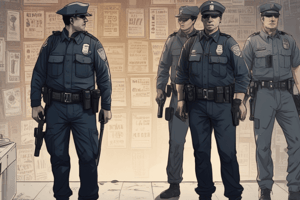Podcast
Questions and Answers
What does Section 146 of the POA justify regarding police use of force?
What does Section 146 of the POA justify regarding police use of force?
- Force can only be used if the officer feels threatened
- Police may use any level of force to apprehend a suspect
- The use of force is prohibited under all circumstances
- Force must be necessary, proportionate, and justifiable (correct)
Can a 15-year-old student be charged under the Trespass to Property Act regardless of age?
Can a 15-year-old student be charged under the Trespass to Property Act regardless of age?
- Only if an adult witnesses the incident
- Yes, they can be charged fully
- They can only be charged through a Part 1 Summons (correct)
- No, they cannot be charged at all
What establishes the authority to search a person arrested under the TPA?
What establishes the authority to search a person arrested under the TPA?
- The discretion of the officer at the scene
- The act itself under which they were charged (correct)
- The Criminal Code of Canada
- The specific regulations of the police department
What Section of the Charter protects individuals from unreasonable search and seizure?
What Section of the Charter protects individuals from unreasonable search and seizure?
Which of the following statements is true regarding arresting individuals for trespassing?
Which of the following statements is true regarding arresting individuals for trespassing?
Which of the following is NOT considered in the Grant analysis for evidence exclusion under Section 24(2) of the Charter?
Which of the following is NOT considered in the Grant analysis for evidence exclusion under Section 24(2) of the Charter?
What must police consider when using force as justified under the law?
What must police consider when using force as justified under the law?
In what scenario is the use of force by a police officer not justified?
In what scenario is the use of force by a police officer not justified?
Which section of the Criminal Code outlines arrest powers for any person?
Which section of the Criminal Code outlines arrest powers for any person?
How is a search defined in legal terms?
How is a search defined in legal terms?
What constitutes an offence under the Trespass to Property Act (TPA)?
What constitutes an offence under the Trespass to Property Act (TPA)?
What is the definition of a seizure?
What is the definition of a seizure?
What is not considered an arrest power for any person?
What is not considered an arrest power for any person?
Which section of the Criminal Code outlines arrest powers specifically for peace officers?
Which section of the Criminal Code outlines arrest powers specifically for peace officers?
Which of the following factors is typically considered when assessing the reasonableness of a search?
Which of the following factors is typically considered when assessing the reasonableness of a search?
In the context of search and seizure laws, what does 'reasonable expectation of privacy' refer to?
In the context of search and seizure laws, what does 'reasonable expectation of privacy' refer to?
Which statement is true regarding the duty book?
Which statement is true regarding the duty book?
Which of the following statements about search and seizure authority is incorrect?
Which of the following statements about search and seizure authority is incorrect?
What type of evidence may be excluded from trial based on a Charter breach analysis?
What type of evidence may be excluded from trial based on a Charter breach analysis?
Reasonable grounds for arrest may be established by observing which of the following?
Reasonable grounds for arrest may be established by observing which of the following?
Which of the following best describes 'section 24(2)' of the Charter?
Which of the following best describes 'section 24(2)' of the Charter?
What must a peace officer demonstrate in order to conduct an arrest?
What must a peace officer demonstrate in order to conduct an arrest?
Which of the following actions is legally justified for any person making an arrest?
Which of the following actions is legally justified for any person making an arrest?
Which statement accurately defines a breach of the peace?
Which statement accurately defines a breach of the peace?
Which of the following is not a requirement for a valid arrest warrant?
Which of the following is not a requirement for a valid arrest warrant?
What is meant by reasonable grounds to believe when establishing probable cause?
What is meant by reasonable grounds to believe when establishing probable cause?
Which of the following actions is not always necessary during a lawful arrest?
Which of the following actions is not always necessary during a lawful arrest?
What must peace officers have to detain an individual for questioning?
What must peace officers have to detain an individual for questioning?
Which of the following is a required element in the issuance of an arrest warrant?
Which of the following is a required element in the issuance of an arrest warrant?
In the context of arrest authority, which option represents a misconception about the necessity of explanations during an arrest?
In the context of arrest authority, which option represents a misconception about the necessity of explanations during an arrest?
Which condition does not support reasonable grounds for believing someone committed an indictable offence?
Which condition does not support reasonable grounds for believing someone committed an indictable offence?
Which of the following is not considered in the Edwards Test for reasonable expectation of privacy?
Which of the following is not considered in the Edwards Test for reasonable expectation of privacy?
In Hunter v. Southam, the Supreme Court of Canada ruled that warrantless searches are treated as:
In Hunter v. Southam, the Supreme Court of Canada ruled that warrantless searches are treated as:
According to R. v. Collins, what criteria must a search meet to be deemed reasonable?
According to R. v. Collins, what criteria must a search meet to be deemed reasonable?
A search incident to arrest requires what in addition to the grounds for the arrest?
A search incident to arrest requires what in addition to the grounds for the arrest?
What types of items can a search incident to arrest be conducted for?
What types of items can a search incident to arrest be conducted for?
Is a strip search permitted in all drug arrests according to current legal standards?
Is a strip search permitted in all drug arrests according to current legal standards?
Can a search incident to detention extend beyond a protective pat down for weapons?
Can a search incident to detention extend beyond a protective pat down for weapons?
What is a major deciding factor in determining the legality of a search under the Criminal Code?
What is a major deciding factor in determining the legality of a search under the Criminal Code?
Flashcards are hidden until you start studying
Study Notes
Arrest Powers and Procedures
- A police officer may arrest a person off premises if:
- The individual has been found in contravention of the law.
- There has been a fresh departure by the person.
- The person refuses to identify themselves or presents a false identity.
- Arrest powers for any person are outlined in Section 495 of the Criminal Code.
- Peace officers have their arrest powers defined in Section 494 of the Criminal Code.
Use of Force by Police
- Section 146 of the POA allows police to use necessary force while on R&PG to enforce laws.
- Justification for using force includes:
- The necessity of action as dictated by law.
- Evaluation of the nature of the offense to ensure proportionality in force applied.
- Requirement to justify any force used.
Trespass to Property Act (TPA)
- Individuals under 16 may be charged with a Part 1 Offence Notice under the TPA when they enter premises unlawfully.
- Authorization for arrest without a warrant under the TPA is granted to police officers, the occupier of premises, or authorized persons if there are reasonable grounds for contravention of the law.
Search Authority
- Authority to conduct a search post-arrest under TPA stems from the act itself, the Criminal Code of Canada, or common law.
- A "search" interferes with a person's reasonable expectation of privacy.
- A "seizure" involves state taking possession of items where there was a reasonable expectation of privacy.
Legal Principles and Standards
- Section 8 of the Charter protects against unreasonable search and seizure.
- Reasonable grounds are necessary to believe a person has committed a criminal offense to warrant an arrest.
- Reasonable suspicion is a lower threshold compared to reasonable belief.
Judicial Rulings
- The Supreme Court of Canada in Hunter v. Southam ruled warrantless searches are generally unreasonable under Section 8.
- The R. v. Collins decision established that a search is reasonable if:
- It is authorized by law.
- The law itself must be reasonable.
- The manner of the search must also be reasonable.
Search Incidents
- A search incident to arrest requires additional reasonable grounds beyond those for the arrest itself.
- Searches can include looking for evidence, weapons, and means of escape.
- Strip searches are permitted only in specific circumstances, primarily linked to drug arrests.
- A search incident to a detention is limited to a pat-down for weapons for safety.
Duty Documentation
- Properly recording all actions in a duty book is critical; omissions cannot be rectified later. Skipping pages in the book is not permissible.
Studying That Suits You
Use AI to generate personalized quizzes and flashcards to suit your learning preferences.




